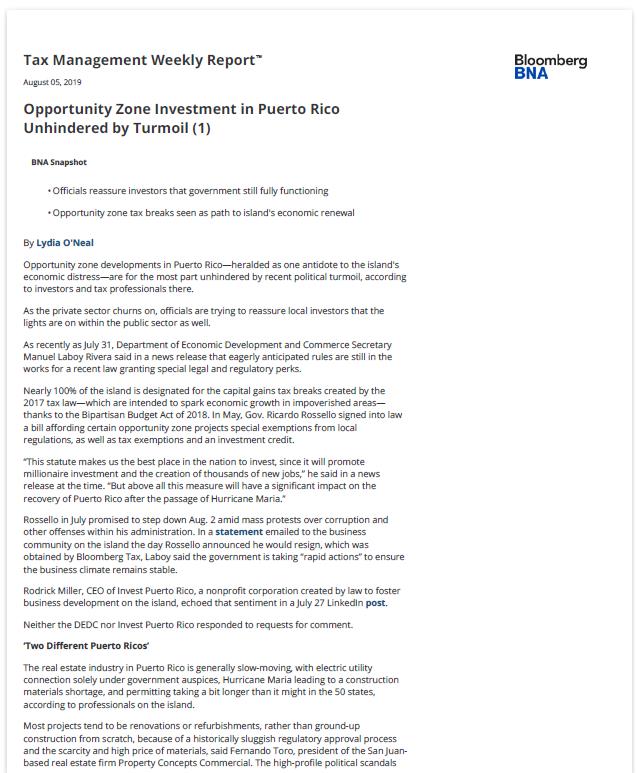-
Financial statements audits
Financial statement audits
-
Compliance audits
Compliance audits
-
Compilations and reviews
Compilations and audit
-
Agreed-upon procedures
Agreed-upon procedures
-
Tax compliance
Business Tax
-
Global mobility services
Through our global organisation of member firms, we support both companies and individuals, providing insightful solutions to minimise the tax burden for both parties.
-
Sales and use tax and indirect taxes
SUT/ VAT & indirect taxes
-
Tax incentives
Navigating the complex landscape of tax incentives in Puerto Rico can be challenging. Whether you're looking to benefit from the Export Services Act (Act 20), the Individual Investors Act (Act 22), or other incentives under Act 60, we provide tailored advice to help you maximize your tax benefits and ensure compliance. Let us help you unlock the potential of doing business in Puerto Rico.
-
Transfer Pricing
The laws surrounding transfer pricing are becoming ever more complex, as tax affairs of multinational companies are facing scrutiny from media, regulators and the public

-
Business consulting
Our business consulting services can help you improve your operational performance and productivity, adding value throughout your growth life cycle.
-
Business Risk Advisory
Risk is inevitable but manageable. We deliver relevant, timely and practical advices to aid organizations manage risk and improve business performance. We can help you identify, understand and manage potential risks to safeguard your business and comply with regulatory requirements.
-
Technology Advisory
We provide comprehensive solutions to safeguard your business and ensure operational resilience and compliance. Our expert team offers a range of technology advisory services designed to address your cybersecurity needs, enhance business continuity, and manage security effectively.
-
Transactional advisory services
Transactions are significant events in the life of a business – a successful deal that can have a lasting impact on the future shape of the organizations involved. Because the stakes are high for both buyers and sellers, experience, determination and pragmatism are required to bring deals safely through to conclusion.
-
Forensic and investigative services
At Grant Thornton, we have a wealth of knowledge in forensic services and can support you with issues such as dispute resolution, fraud and insurance claims.

Tax Management Weekly Report, Bloomberg
By Lydia O'Neal
Opportunity zone developments in Puerto Rico—heralded as one antidote to the island's economic distress—are for the most part unhindered by recent political turmoil, according to investors and tax professionals there.
As the private sector churns on, officials are trying to reassure local investors that the lights are on within the public sector as well.
As recently as July 31, Department of Economic Development and Commerce Secretary Manuel Laboy Rivera said in a news release that eagerly anticipated rules are still in the works for a recent law granting special legal and regulatory perks.
Nearly 100% of the island is designated for the capital gains tax breaks created by the 2017 tax law—which are intended to spark economic growth in impoverished areas—thanks to the Bipartisan Budget Act of 2018. In May, Gov. Ricardo Rossello signed into law a bill affording certain opportunity zone projects special exemptions from local regulations, as well as tax exemptions and an investment credit.
“This statute makes us the best place in the nation to invest, since it will promote millionaire investment and the creation of thousands of new jobs,” he said in a news release at the time. “But above all this measure will have a signifcant impact on the recovery of Puerto Rico after the passage of Hurricane Maria.”
Rossello in July promised to step down Aug. 2 amid mass protests over corruption and other offenses within his administration. In a statement emailed to the business community on the island the day Rossello announced he would resign, which was obtained by Bloomberg Tax, Laboy said the government is taking "rapid actions" to ensure the business climate remains stable.
Rodrick Miller, CEO of Invest Puerto Rico, a nonprofit corporation created by law to foster business development on the island, echoed that sentiment in a July 27 LinkedIn post.
Neither the DEDC nor Invest Puerto Rico responded to requests for comment.
'Two Different Puerto Ricos'
The real estate industry in Puerto Rico is generally slow-moving, with electric utility connection solely under government auspices, Hurricane Maria leading to a construction materials shortage, and permitting taking a bit longer than it might in the 50 states, according to professionals on the island.
Most projects tend to be renovations or refurbishments, rather than ground-up construction from scratch, because of a historically sluggish regulatory approval process and the scarcity and high price of materials, said Fernando Toro, president of the San Juan-based real estate firm Property Concepts Commercial. The high-profile political scandals gave some potential investors pause, Toro said, but he doesn't expect that hesitance to last.
“Certainly, it's a new thing, so people are kind of watchful to see how this turns out,” Toro told Bloomberg Tax. “At the end of the day, I don't think anything major will come out of it.”
But aside from the regulations for Law 21, the local opportunity zone legislation passed in May, investors say they haven't been waiting around for government services any longer than usual, even with the resignations of Rossello and Christian Sobrino, the island's chief financial officer.
“Everything's still open,” said Dan Kodsi, CEO of Royal Palm Cos., which is building a Hyatt Regency in a newly-designated census tract on the island and plans to launch an opportunity fund. “Just because there's been a few bad apples in government doesn't mean the whole island has to suffer.”
Rossello announced the project—an acquisition of the former Gran Melia hotel in Rio Grande—to much fanfare in June. It will sit just north of a golf course that once licensed the Donald Trump name, in Coco Beach. A news release from Rossello's office highlighted the Hyatt project's “competitive advantage” in light of the island's being almost completely covered in opportunity zones.
“It's two different Puerto Ricos—there's the political stuff and the turmoil, and there's the private sector,” said Ricky Santana, managing partner of the real estate and business consulting group Colectivo 360, which is advising opportunity zone projects. “The government changes every four years, but the rest of society is still here.”
'Priority Projects'
Still, investors are eagerly anticipating regulations for Law 21, which gives “priority projects” special preferences, such as exemption from several local laws, including one related to licensing and permitting. But it has yet to say what constitutes a priority project.
“The definition of priority projects is quite vague, and so is the public policy framework that is stated in the law,” said Javier Balmaceda, a senior policy analyst focusing on Puerto Rico at the Center on Budget Policy and Priorities.
He added, however, that the DEDC's process of coming up with a definition shouldn't be affected by the government's political turmoil.
The law's expedited permitting is just one element of the government's efforts to speed things up for developers trying to get to work on the island, said Maria de los Angeles Rivera, head of tax at Kevane Grant Thornton LLP, a subsidiary of the global consulting firm in Puerto Rico. Under Law 60, passed July 1, the government created a one-stop shop “Single Business Portal” for incentive applications, she said.
The bureaucratic lag that the portal and the opportunity zone legislation's expedited permitting seek to remedy weren't exacerbated by political corruption, Rivera said.
“We receive calls every day,” she said. “We are holding meetings and calls every day of people interested in opportunity zones in Puerto Rico.”
To contact the reporter on this story: Lydia O'Neal in Washington at
loneal@bloombergtax.com
To contact the editors responsible for this story: Patrick Ambrosio at pambrosio@bloombergtax.com; Karen Saunders at ksaunders@bloombergtax.com

